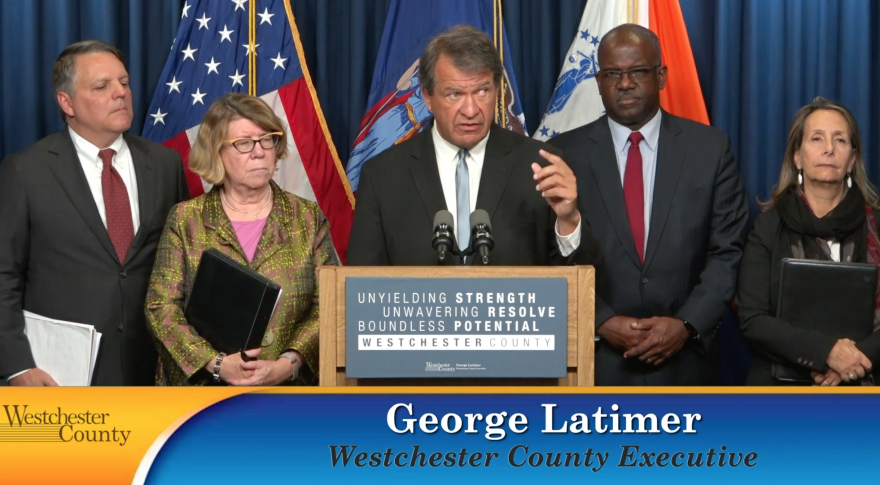Westchester County Executive George Latimer’s $2.4 billion operating budget would increase spending without increasing property taxes for a fifth straight year. The Democrat tells WAMC a lot of that new money comes from the federal American Rescue Plan Act — but they won’t be able to rely on that for long. Additionally, he says the county is already seeing a rise in costs shifted over from New York state, which is anticipating a difficult budget next year.
With one eye on the future, Latimer says his plan aims to tackle what it can, while it can.
“We’re comfortably going into the new year with a balanced budget, but it’s become unbalanced if the state situation is problematic," he explains. "Now look down the road two years, and a lot of it has to do with what’s happening in the national economy. The strategies that they’re using to try to deal with inflation could also put us in a recessionary mode.”
An analysis by New York State Comptroller Tom DiNapoli recently lowered Westchester County’s level of fiscal stress to zero, the best score that a municipality can receive.
Looking at the budget itself, Latimer’s plan would set aside a whopping $90-100 million for housing projects. Roughly half of that would go into the county’s Affordable Housing Investment Flex Fund, with the remainder going toward land acquisition and infrastructure projects to support new homes. Latimer says the budget also allocates $25 million for the continued installation of EV charging stations, particularly at county parking facilities.
In new initiatives, Latimer says his budget would dedicate $7 million to a Landlord and Tenant Assistance Program, helping housing authorities fund necessary repairs at their rental properties. After flooding devastated much of the Hudson Valley this year, Latimer’s plan would also create a non-FEMA emergency recovery program, granting roughly $300,000 to two nonprofits that would help residents relocate and rebuild in the event of a fire or flood.
Health programs are also a major focus. Latimer says they’ve boosted spending to address maternal mortality, tobacco cessation, and mental health in the county. A roughly $1 million pilot program aims to expand capacity at outpatient mental health clinics.
“There’s a lot of things that we’re doing that we’re proud of, and we’re hopeful of — because you don't solve these things in a year," adds Latimer. "You hope that you make a stride, and then you hope next year that maybe you don’t need as much money, because you’ve gotten some result.”
Latimer says the board of legislators will host multiple public hearings on the budget in the coming weeks. A finalized version must be approved by the end of the year, but Latimer expects a vote around December 11.
“There will be changes to the budget, from what we’ve submitted. But that’s the give and take of democracy," he notes. "And we’re listening to both sides of the aisle. I’ve made outreach to both the Republicans as well as my fellow Democrats to make sure that everybody’s voice is heard before we finalize the budget about a month from now.”
Minority Leader Margaret Cunzio, a Conservative, did not return a request for comment.
In Sullivan County, County Manager Joshua Potosek recently presented a $288.5 million budget for 2024 that also keeps the property tax levy flat and avoids pulling from loans or the General Fund for operations. Potosek says high inflation has driven up the costs of county services, but it has also increased the county’s sales tax revenue. His plan would lean into that for 2024.
"We are anticipating an increased sales tax," says Potosek. "We're generally getting more sales tax on all of those things that cost a little bit more."
Meantime, Potosek says bonding will allow the county to infuse a historic $23.6 million into its roads and bridges. Among some of the other largest projects in the budget are $2 million for renovating county offices and $2 million to establish a Housing Trust Fund to create affordable housing. Potosek says the exact details of the trust still need to be worked out, but he’s been looking at similar funds in Ulster and Dutchess Counties for inspiration. Ultimately, he plans to leave it to the next county legislature to decide the parameters.
“We’re basically proposing using some existing fund balance to get the trust created, and they would have next year to deliberate and come up with a mechanism of how they’d like to fund the trust going forward," Potosek explains.
Potosek says his budget would expand the county’s Move Sullivan bus routes to areas like Roscoe and Narrowsburg. The plan also allocates $700,000 to continue the Sullivan Promise Scholarship program at SUNY Sullivan. Under the program, local high school graduates can receive up to two years of free tuition.
The Sheriff’s Office especially is seeing a boost in investment, with $360,000 to replace county patrol vehicles and $165,000 to hire additional dispatchers. Potosek’s budget would also increase salaries at the District Attorney’s Office, boosting pay for current assistant DAs and setting a starting salary of $90,000 a year for all vacant assistant DA positions. Potosek hopes the higher salaries will help attract and retain talent for what he says has been a very busy office the past few years.
"I think it's a solid spending plan. Two years in a row [of] not changing the tax levy, but we're cautious about what's on the horizon," says Potosek. "We're doing pretty well right now, but we still need to be fiscally prudent and cautious of what's coming in the future."
The Sullivan County legislature has until December 20 to sign off on the plan.



